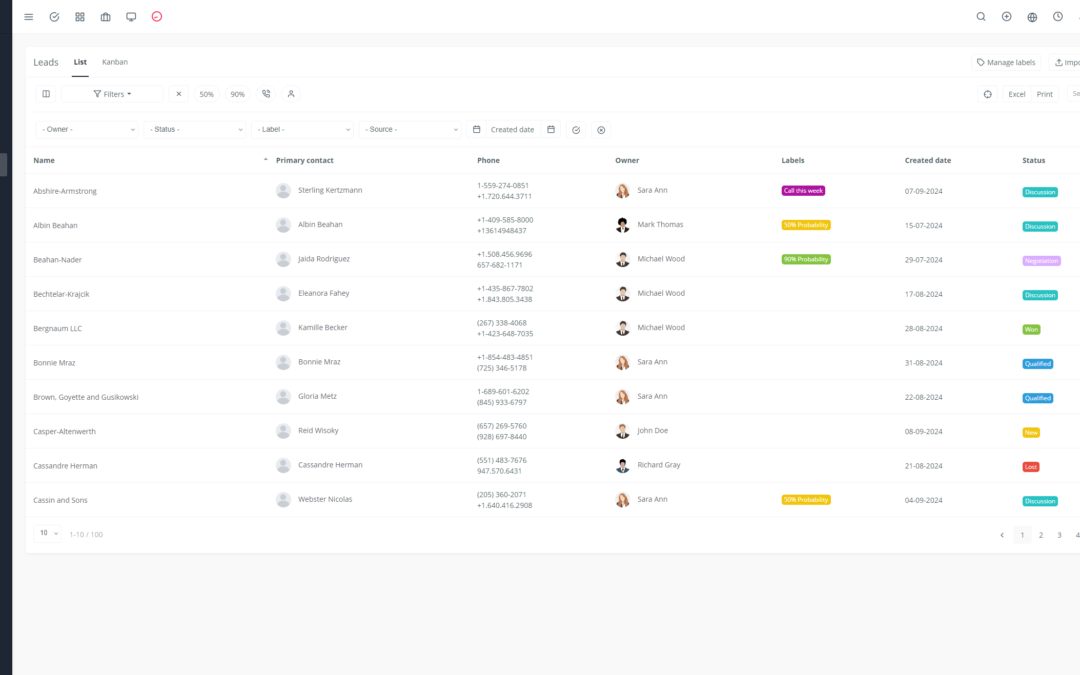Recruitment is a costly and time-consuming process. Utilizing a recruitment-specific Customer Relationship Management (CRM) system, such as Yoneos CRM, can significantly improve efficiency and reduce costs. But how can you accurately measure the return on investment (ROI) of Yoneos CRM?
This article guides you through a methodical approach to measure Yoneos CRM ROI and demonstrate its positive impact on your recruitment strategy.
1. Define Your Recruitment Goals 🎯
Before implementing Yoneos CRM, it’s crucial to set clear and measurable recruitment goals. For instance:
Reduce average time-to-hire by 20% ⏳
Increase the number of hires by 15% 📈
Improve hire quality by increasing retention rate by 10% 🤝
2. Identify Key Performance Indicators (KPIs) 📊
Once you’ve defined your goals, identify the KPIs that will allow you to measure your progress:
Cost per hire: Calculate the total cost of the recruitment process divided by the number of hires. 💰
Average time-to-hire: Measure the time between posting a job opening and hiring a candidate. ⏰
Application rate: Evaluate the number of applications received for each job opening. 📨
Acceptance rate: Measure the percentage of candidates who accept a job offer. ✅
Employee retention rate: Track the percentage of employees who remain with the company after a given period. 🤝
3. Track Hires and Hire Quality 📈
Use Yoneos CRM to track the number of hires and measure hire quality. This can include:
Employee performance: Evaluate the performance of new hires against goals and expectations. 🌟
Employee satisfaction: Measure the level of satisfaction of new hires with their work and the company. 😊
4. Analyze Time Spent on the Recruitment Process ⏱️
Compare the time spent on the recruitment process before and after implementing Yoneos CRM. Analyze tasks that take the most time and identify efficiency gains through automation.
5. Evaluate the Effectiveness of Automated Recruitment Processes 🤖
Yoneos CRM automates many repetitive tasks, such as:
Application tracking: Automating responses to applications and status updates. 📨
Communication: Automating scheduling and sending follow-up emails and interview invitations. 📧
Candidate assessment: Automating the scoring and filtering process for applications. 📝
6. Calculate the Total Cost of the Recruitment Process 💰
Calculate the total cost of the recruitment process by considering the following:
Recruiter time: Time spent on recruiting, including interviews, candidate sourcing, etc. ⏰
Resources: Costs of software, recruiting tools, and travel expenses. 💸
Other costs: Job advertising fees, recruitment agency fees, etc. 💸
7. Compare Costs Before and After Yoneos CRM 📉
Compare the total cost of the recruitment process before and after using Yoneos CRM to identify the savings achieved.
8. Measure the Impact on Candidate and Recruiter Satisfaction 😊
Yoneos CRM can improve candidate satisfaction by providing a more seamless and personalized experience.
Candidate experience: Real-time tracking of their application, proactive communication, and quick responses. 📨
Recruiter experience: Intuitive interface, automation tools, and access to valuable data and insights. 📈
9. Evaluate Collaboration Among Recruitment Teams 🤝
Yoneos CRM facilitates collaboration among recruitment teams by sharing information and managing tasks centrally.
10. Reduce Manual Errors and Duplication 🚫
The automation offered by Yoneos CRM reduces manual errors and duplication in the recruitment process.
11. Faster and More Informed Decision Making 🧠
Yoneos CRM offers valuable analytics and reporting that allows recruiters to make more informed and faster decisions.
12. Analyze Recruitment Data to Identify Trends and Opportunities 📊
Yoneos CRM enables analyzing recruitment data to identify market trends, the best recruitment channels, and in-demand skills.
13. Integrate with Other HR Tools and Systems 🧩
Yoneos CRM integrates seamlessly with other HR tools and systems, such as recruitment platforms, talent management systems, and communication tools.
14. Added Value Compared to Other CRM Solutions 🏆
Yoneos CRM offers recruitment-specific features that differentiate it from other more general CRM solutions.
15. Impact on Overall Business ROI 💰
Improved hire quality and reduced recruitment costs contribute to the overall ROI of the business.
16. Challenges and Opportunities 🤔
Challenges: User adoption, integration with existing systems, implementation costs.
Opportunities: Improved recruitment processes, reduced costs, enhanced hire quality.
17. Real-World Examples of Measurable Successes 🎉
Reduced average time-to-hire by 25% ⏳
Increased employee retention rate by 10% 🤝
Decreased cost per hire by 15% 💰
18. Relevance and Reliability of Collected Data 📊
Ensure that data collected by Yoneos CRM is relevant, reliable, and complete to accurately measure ROI.
19. Sensitivity Analysis 🧮
Conduct a sensitivity analysis to determine the impact of assumptions on ROI results.
20. Recommendations for Optimizing Yoneos CRM Utilization 🚀
User training: Ensure recruiters are properly trained on how to use Yoneos CRM.
Custom configuration: Configure Yoneos CRM to meet the specific needs of your organization.
KPI tracking: Track key KPIs to measure Yoneos CRM’s impact on your recruitment strategy.
Continuous improvement:* Constantly seek ways to improve Yoneos CRM utilization to maximize ROI.
By following these steps and strategically using Yoneos CRM, you can significantly enhance your recruitment process, reduce costs, and increase the overall ROI of your business. 📈🤝🎉

